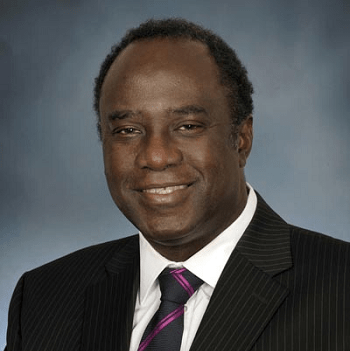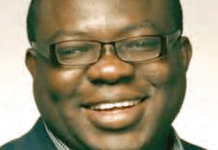Curbing the endemic abuse of alcohol and illicit drugs is a major challenge in most countries of the world. According to the 2016 World Drug Report published by the United Nations Office of Drug and Crime, there are approximately 247 million drug users worldwide.
One of the significant issues concerning drug abuse is the high risk for developing an addiction. Efforts by researchers to find an effective treatment for drug addiction had proved abortive for years – until Professor Bankole Johnson, a Nigerian-American Professor of Psychiatry, Pharmacology and Neurology discovered that the solution was in topiramate, a gamma-aminobutyric acid (GABA) facilitator and glutamate antagonist.
Today he is widely acclaimed as a pioneer in the development of medications for the treatment of alcohol, as well as being one of the world’s leading authorities on the subject of drug addiction. He is also a licensed physician and board-certified psychiatrist throughout Europe and the United States and served as Alumni Professor and Chairman of the Department of Psychiatry and Neurobehavioral Sciences at the University of Virginia.

Publication and recognition
Prof. Johnson’s research paper on his topiramate findings was published in 2007 in the Journal of the American Medical Association (JAMA) and titled “Topiramate for treating alcohol dependence: a randomised controlled trial”. Soon after, the work gained national and international media attention. The study results were featured on several media outlets and brought him greater recognition. He appeared in the Home Box Office (HBO) original documentary feature, “Addiction”, which won the prestigious Governors Award, a special Emmy Award, from the Academy of Television Arts and Sciences in the year 2007. He has been listed in “Best Doctors in America” in 2007, 2009-2010, by Best Doctors Inc.
Interestingly, that discovery by Prof. Johnson was just the culmination of all the efforts he had made towards finding a lasting solution to the problem of addiction. In fact, as far back as 2001, his efforts had started to gain recognition and he had been given the Dan Anderson Research Award from the Hazelden Foundation for his “distinguished contribution as a researcher who has advanced the scientific knowledge of addiction recovery.” Two years later, he was inducted into the Texas Hall of Fame for his contributions to science, mathematics, and technology.
Educational background
Prof. Johnson was born on 5 November 1959 in Nigeria. In 1970, after the Nigerian civil war, he gained admission into King’s College in Lagos and received his senior secondary certificate in 1975. He also received a general diploma at Davies’ College in Sussex, England, followed by a diploma in French Studies at the Institute Catholique de Paris in Paris, France.
He was admitted into the University of Glasgow, Scotland in 1977 and graduated in 1982 with a Medicinae Baccalaureum et Chirurgie Baccalaureum degree. He went on to specialise in psychiatry at the Royal London and Maudsley and Bethlem Royal Hospitals, and to train in research at the Institute of Psychiatry (University of London).
In 1991, he graduated from the University of London with a Master of Philosophy degree in neuropsychiatry. He conducted his doctoral research at Oxford University and obtained a doctorate degree in medicine, Medicinae Doctorem, from the University of Glasgow in 1993. Most recently, in 2004, he earned his Doctor of Science degree in medicine from the University of Glasgow – the highest degree that can be granted in science by a British university.
Career
In 1993, Prof. Johnson joined the faculty at the University of Texas Health Science Centre in Houston and later became the deputy chairman for research and chief of the division of Alcohol and Drug Addiction in the Department of Psychiatry at the University of Texas Health Science Centre in San Antonio in 1998.
In 2002, the erudite researcher received the Distinguished Senior Scholar of Distinction Award from the National Medical Association. He also received the American Psychiatric Association Distinguished Psychiatrist Lecturer Award, in 2006 for outstanding achievement in the field of psychiatry as an educator, researcher, and clinician.
Prof. Johnson is a recipient of the Solomon Carter Fuller Award (2009) from the American Psychiatric Association which honours individuals who have pioneered in an area that has benefited significantly the quality of life for black people. He also received the Jack Mendelson Award from the National Institute on Alcohol Abuse and Alcoholism (NIAAA) in 2013.
Prof. Johnson has served as a board member of many prestigious medical councils and institutions in the United States. These include Medications Development Subcommittee of NIDA’s Advisory Council on Drug Abuse, (2004–2007); Extramural Advisory Board for NIH/NIAAA, (2004–present); and Medications Development Scientific Advisory Board for NIH/NIDA, (2005–2009).
In September 2004, Prof. Johnson accepted an appointment to serve as Alumni Professor and Chairman of the Department of Psychiatric Medicine at the University of Virginia. He became a fellow of the Royal College of Psychiatrists in 2007. In 2009 Johnson was named associate editor of the editorial board of The American Journal of Psychiatry, and from 2010 to 2011 he served as field editor-in-chief of Frontiers in Psychiatry.
Research focus
Prof. Johnson’s research focus is on the neuro-psychopharmacology of addiction. His work integrates the neuroscience and behavioural aspects of addiction medicine with the goal of formulating a more thorough understanding of the basis of drug-seeking behaviour and developing effective treatments.
The focal point of his research is the role and interaction between midbrain monoamine systems with a focus on serotonin, gamma-aminobutyric acid (GABA)/glutamate and dopamine.
One of the interesting things about alcohol dependence is that alcohol itself is a weakly-addictive drug which has no receptors in the brain, unlike other psychoactive drugs. If it was powerfully addictive, almost everybody in the world would be addicted to alcohol. 60 per cent of alcohol-dependence is inherited and about 40 per cent is acquired. Treatment outcomes vary in different individuals because only the acquired traits of the alcoholics are usually considered. This means that if you don’t have a specialised pharmacological treatment of any kind, then you would only be working on the 40 per cent of the disease, which is not particularly effective.
Another interesting fact is that alcohol dependence has a very high spontaneous remission rate, according to Prof. Johnson. This means that, of any given four patients with alcohol dependence, one of them will recover spontaneously in one year.
Prof. Johnson seeks to focus his treatment on the ambivalent, weak-willed persons who don’t really want treatment, because they’re the most vulnerable. His current research involves clinical trials and human laboratory studies, and includes neuroimaging and molecular genetics.
He now incorporates neuroimaging evaluations into his drug interaction studies to identify the site-specific effects of abused drugs and to evaluate the effectiveness of potential medications for the treatment of addiction. Current studies include a clinical trial aimed at determining the effectiveness of ondansetron, a serotonin-3 antagonist, for the treatment of subtypes of alcoholism, as well as a human laboratory project trying to elucidate the effects of naltrexone and acamprosate on hepatic and renal function in alcohol-dependent individuals.
References:
Wikipedia: https://en.wikipedia.org/wiki/Bankole_Johnson
Differentbrains.org: http://differentbrains.org/neurodiversity-overcoming-addiction-interview-dr-bankole-johnson/
http://www.medschool.umaryland.edu/profiles/Johnson-Bankole/










